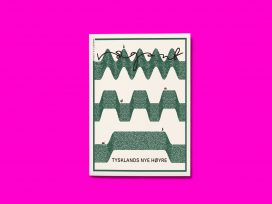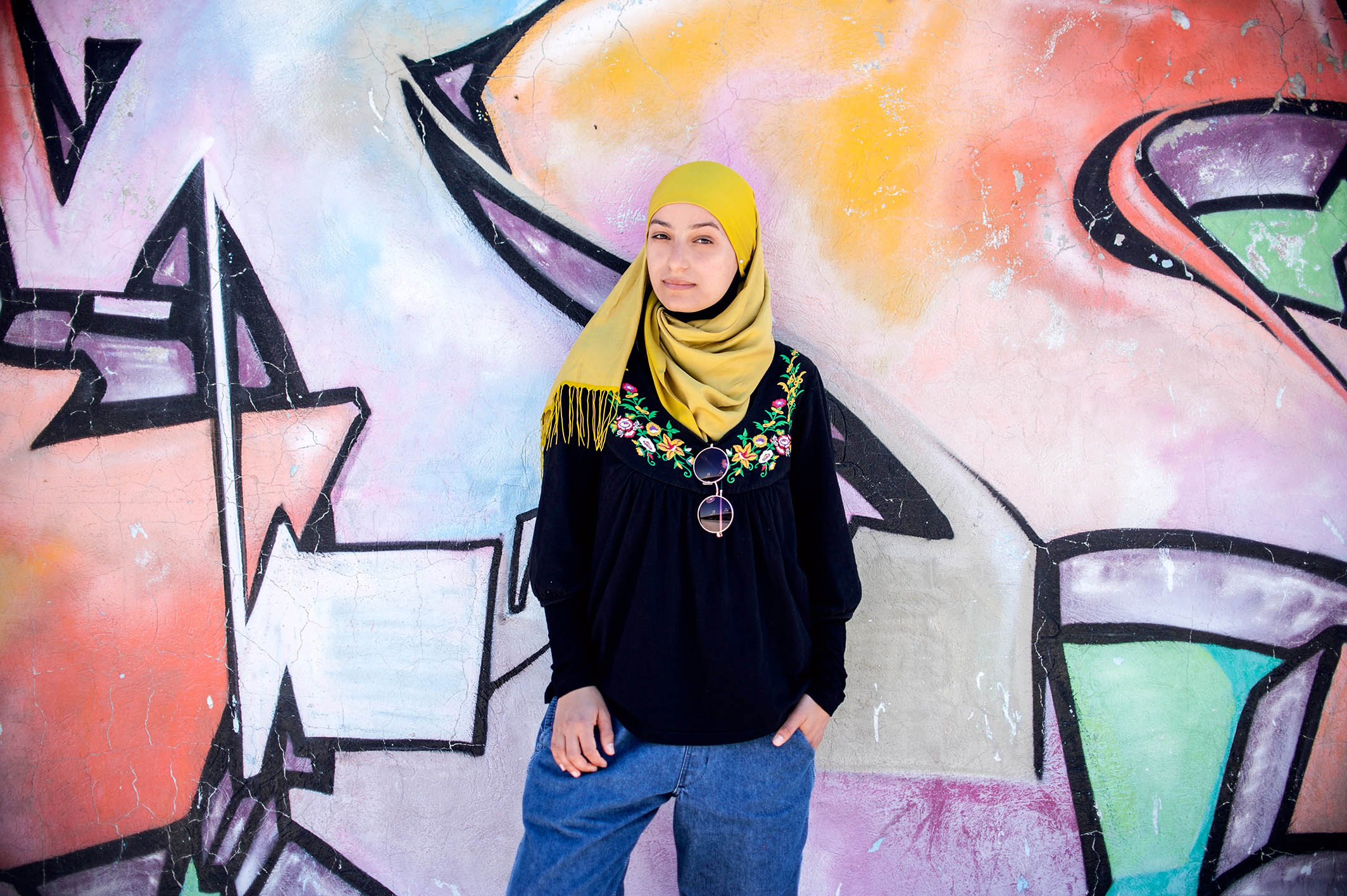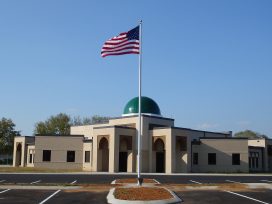
Kulturkampf
Vagant 2–3/2020
‘Vagant’ explores intellectual landscapes of the New Right: including Thilo Sarrazin, Monika Maron and Michel Onfray. Also, a conversation with Danish novelist Olga Ravn Ravn about dominant attitudes to motherhood.
Can Tunisia’s Islamist party Ennahdha secure the gains of the 2011 uprising and adapt itself to secular democracy? The coalition has been praised for its progressiveness as its new constitution enshrined sexual equality, omitted Sharia law, and maintained the separation between ‘mosque and state’. Leftists, however, fear that these are ‘fig leaf’ measures.
The 27th day of Ramadan is a ceremonial occasion for the mayor’s office in Tunis. It is the Laylat al-Qadr, the Night of Destiny, one of two times in the year when the mayor welcomes the president to the Zitouna Mosque in the heart of the Medina. When I met the mayor, Souad Abderrahim, in the city hall in April, she said that her office was preparing both logistically and liturgically. In the run-up to the 2018 mayoral elections, she was said to be unfit for the post because, as a woman, she would not be able to welcome the president in the mosque. Now, the mayor needs to negotiate with the leaders of the 1,321-year-old religious institution.
Perhaps surprisingly, the person who raised the issue is a member of the ‘secular’ party Nidaa Tounes. Meanwhile Abderrahim, who was elected on the list of the Islamist party Ennahdha, told me that neither law nor religion prevents her from fulfilling this role. ‘It is a new experience, but there is nothing against the presence of women in the mosque. In Mecca, the men and women pray side by side,’ said Abderrahim, confidently. ‘Inshallah, I will be [there] with the President of the Republic.’
Abderrahim, her head uncovered, was dressed in a smart grey suit and pink stilettos that matched her rose gold iPhone. Her history with Ennahdha dates back to university when she was active alongside members of the movement in the UGTE, an Islamist-leaning student union. However, she was never part of the movement. After the revolution in 2011, she wasn’t thinking of entering politics – until the leaders of Ennahdha came to see her.
‘They asked me to present my candidature for the legislative elections,’ said Abderrahim. ‘At the time there were some of Ennahdha’s base that did not accept me. They say, why are you presenting a woman that is not one of ours?’
Abderrahim illustrates Ennahdha’s effort to move from a close-knit secret Islamic movement to a party that could represent all Tunisians. She stressed that Ennahdha is a ‘civil party’ and called herself a ‘living guarantee’ that Ennahdha are not going to impose ‘their model’ on Tunisian society. Khadija Cherif, a leading figure in the Tunisian Association of Democratic Women, is not reassured, however. ‘Symbolically, it is a good thing for a woman to be a mayor,’ she told me. ‘But it is not a guarantee.’

A challenging relationship: Ennahdha is trying to balance secular democary with the religious demands of its Islamist base.
Photo by Med Mhamdi for Breakreate from Unsplash.
In 2011, Abderrahim came under fire for calling single mothers an ‘abomination’ that ‘ethically . . . do not have the right to exist.’ She has since apologised and says that the media misconstrued her words, but critics within Tunisia read this inconsistency as a sign of a certain ambiguity in Ennahdha’s politics on religion.
For the first few decades of its existence, Ennahdha operated underground. It started as a sort of Islamic study group under Habib Bourguiba, Tunisia’s first president after independence. Bourguiba cracked down on the group, which became increasingly political in the 1980s, with many members arrested or exiled. Meanwhile, Bourguiba pushed forward modernising reforms that prioritised women’s rights and education. He declared Tunisia to be ‘part of the western world’ and publicly derided traditional Islamic practices. He forced women to remove their headscarves and he broke his fast in the middle of the day during Ramadan. ‘I can be more useful to my country if I am not sitting in a corner yawning and hungry,’ he said, sipping a secular glass of orange juice on public television in 1962.
The repression continued during the regime of Zine El Abidine Ben Ali, who imprisoned and tortured Islamists while promoting a state-sanctioned form of Islam until he was ousted by the 2011 revolution, the first in a wave of uprisings in the ‘Arab Spring’.
After the revolution, Ennahdha won 37 per cent of the vote in the country’s first free elections. The eight next most successful parties together received 35 per cent. Cautious about taking power, Ennahdha entered into a coalition with two secular parties, forming the ‘Troika’ government. Eight months later, when the Muslim Brotherhood narrowly won the election in Egypt, the leader of Ennahdha, Rachid Ghannouchi, flew to Egypt to tell president Mohamed Morsi one thing: ‘Do not govern alone.’ His concerns were vindicated in 2013 when Morsi was ousted in a military coup.
‘I don’t see the Brotherhood as a complete political force, it’s a force of protest,’ said Said Ferjani, one of Ennahdha’s leaders, sitting in a self-styled office in the corner of a tea house in Tunis. ‘They know what they don’t want but they don’t come up with what it should be. [They say], ‘The Koran is our constitution’ but you can come out of the Koran with many constitutions.’
While in Egypt the Islamists failed to democratise their party and appease the secular elites, Tunisia’s Islamist-secular coalition drafted a constitution that was praised internationally for its progressiveness. It enshrined equality of men and women (not ‘compatibility’ of women with men, as Ennahdha members had originally argued for) and freedom of conscience. They omitted sharia law from the constitution, which prompted protests from Salafists as well as some Ennahdha members.
‘[Ennahdha] use the idea of wassatiya – ‘the centre’ – that Islam is the religion of the centre. They needed to make it acceptable to both sides: to the secularists and the Islamists,’ Fabio Merone, a scholar of political Islam at Ghent University, told me. ‘But in 2011/12, the Salafists became strong when it was understood that Ennahdha was moderate, and for secularists, anything done by Ghannouchi was ambiguous.’
Tunisia plummeted into political crisis in 2013 after the assassination of two opposition leaders, Chokri Belaid and Mohamed Brahmi, prompting Ennahdha to hand power to a caretaker government to calm rocketing polarisation between secularists and Islamists.
Ennahdha are afraid of provoking the secular parties, according to Shadi Hamid, author of Islamic Exceptionalism: How the Struggle Over Islam Is Reshaping the World. ‘They saw what happened with Egypt and that had a big impact on them. [Their fear] might not seem reasonable to us but keep in mind their history of repression.’
In May 2016 at a party congress, Ennahdha’s theme song filled the Rades olympic Hall and jubilant party members waved white (Ennahdha) and red (Tunisian) flags. To a crowd of 13,000 people, Ghannouchi announced the separation of political activity from religious and preaching work. The party shed its ‘Islamist’ label and rebranded themselves as ‘Muslim democrats’, comparing themselves in interviews to Germany’s Christian Democrats.
Ferjani reiterated this comparison and told me that En- nahdha’s politics now has only a ‘flavour of faith’.
‘Islamism is no longer relevant to the new era, it is related to protest [but now] it is clear that your identity is entrenched in the constitution,’ he said, referring to the first article of the Tunisian constitution, which defines Tunisia as a Muslim country. ‘Plus you are paying a heavy bill because Islamism is [everything] from Daesh to the Brotherhood.’
Ennahdha’s political evolution was applauded abroad, with media outlets characterising the move as a separation between ‘mosque and state’. However, their opponents within Tunisia are not convinced. After the party’s 2016 declaration, leftist cartoonist Tawfiq Omrane sketched this separation as a decapitated Ghannouchi. ‘To me, they are liars. [Islam] is their political baggage,’ he said at an exhibition in Tunis. ‘And I think they can’t survive without it.’ Many people share these suspicions. ‘They saw when they were in the Troika government that society resisted their politics but when they have the majority, what are they going to do?’ said one Tunis-based activist, who asked to remain anonymous. ‘We applauded Turkey[’s Islamist party] for being moderate and look what happened.’ ‘They are kind of the gentle, fluffy, nice, kind Islamist party,’ Hamid told me. ‘They have emphasised compromise [but] it is almost as if their moderation is over the top, it’s ostentatious. It’s a moderation that they really want to show you and demonstrate to you.’
During a conversation in between voting sessions at Tunisia’s parliament in Bardo, Meherzia Labidi, a member of parliament and the daughter of an imam, used the word ‘democracy’ and its derivatives 25 times. ‘[Ennahdha] is certainly not a party to Islamise Tunisia,’ Labidi told me, pre-emptively responding to a common accusation against the party. ‘Tunisia already has its own Islam. Ennahdha adapted itself to Tunisian Islam and not the other way round.’
Though they are not part of the government, Ennahdha members currently hold the majority in parliament and their members are noted for their discipline in attending voting sessions. They have the most organised and extensive network of any political party, with offices in more than 2,000 localities across the country.
Ennahdha’s dance between modernity, democracy and a predominantly conservative voter base was clear when MP Jamila Ksiksi double-booked herself with me and one of her constituents from a northern neighbourhood of Tunis. Sitting on a red velvet sofa in a side hall of the parliament cupola, Ksiksi said she often invites voters to discuss issues with her in person or on Facebook. Mr Kamel was there to take issue with the decision to raise the retirement age to 62. The subject of inheritance came up.
Last year, in what was widely seen as a political move to win votes from secularists and push Islamists into an ideological corner, President Beji Caid Essebsi proposed to change the country’s inheritance law, which is based on Islamic law, and grant women equal rights to men.
The country’s elected representatives debated. Religious arguments resurfaced alongside democratic ones. ‘There is a big attachment to religion [among voters],’ said Ksiksi, who played a leading role in pushing through an anti-discrimination law. ‘When you ask a Muslim to adopt a rule that is against his faith, he will not accept it because it is a conviction for him. you are going to create a problem between him and le bon dieu [the good lord].’
She brought in Mr Kamel: ‘Are you against equality in heritage?’ He was, and he explained why. ‘He is a bit conservative,’ Ksiki said, hesitating before translating: ‘He says that the woman must give all of her energy for her children – something that I don’t completely agree with.’
National polls on the subject suggest that the majority of Tunisians are against the law, which Labidi feels was put forward by the president for political ends. ‘In an electoral year we cannot discuss such a sensitive issue touching family, creed and economy, so I think we need more time,’ said Labidi, who is against changing the law because it ‘contradicts fundamental and clear explicit texts.’
The Parc de Jardin café in the southern town of Medenine used to belong to a member of Ben Ali’s party; now, its owner is an adherent of Ennahdha. Mejdi Abcha, a cashier at the café, wasn’t sure about whether he would vote in the elections at the end of this year. ‘That’s Ennahdha and that’s the revolution,’ he said, pointing to a cat walking across the terrace with a dead bird in its mouth. ‘They came to change Tunisia but they ended up changing themselves.’
Under Ben Ali, Abcha dodged the police in internet cafés, writing Facebook posts criticising the regime. An Islamist, he voted for Ennahdha in 2011. ‘They were attacked and under injustice during the Ben Ali period and everyone thought they were real Muslims, good and honest people,’ he told me. ‘[But] they prefer to stay in power and govern rather than protecting Islam and the revolution.’
There has been grumbling among Ennahdha members and supporters over the party’s compromises, said Hamid. ‘They are not the same but they stem from a similar impulse, to be cautious and careful and pro-consensus with the main party Nidaa Tounes, which is neither revolutionary nor religious in orientation.’
On a visit to Medenine in March, Ghannouchi declared that Ennahdha does not need to run an electoral campaign in the south. ‘He was joking a bit but it’s true,’ said Fethi Karoud, a member of the local religious shura council. ‘People here know Ennahdha and each family has a victim touched by the dictatorship so we are close to everyone.’
Karoud has asthma from his time in prison. He was invited to the movement while he was at school by a student a few years above him. He followed him to a secret makeshift mosque in a private home and they spoke about the Koran and politics. He opposed Bourguiba, who he says ‘was against everything that was Islam.’ Imprisoned multiple times, tortured and sexually harassed, he went on hunger strike. When he was released and put under house arrest, he asked to be taken back to jail: ‘you could do nothing, go nowhere, no politics.’
Now he is much more staid, conciliatory; wearing a tweed jacket in the baking southern heat. ‘I would have liked things to be more defined and precise [in the constitution],’ he said. ‘We should have insisted that there can be no legal projects that are against Islam, like the inheritance law. But maybe in the future we’ll vote these things in, depending on the era and the people.’
Medenine will probably remain with Ennahdha in the election this year but the younger generation are less connected to the party than their parents. over the last eight years, the government’s inability to pull Tunisia out of an economic crisis or curb corruption has put many young people off voting. ‘There is a population of 360,000 [in Medenine] and only 60,000 go to vote because people are not convinced,’ said Khaled Lamloumi, a cultural worker. ‘The young people have no trust for any political party in Tunisia.’
In the municipal elections last year – hailed as an im-portant step for Tunisia’s democratic transition – voter turnout, especially among young people, was low. Independent candidates took the majority of the vote, followed by Ennahdha, demonstrating a general disillusionment with the ruling parties.
‘They are all old and it’s the same thing whoever I vote for, they will steal the money and go,’ said Jarry Taha, a 21-year-old who says he won’t vote this year. ‘About religion, it’s mostly old people who follow but we cannot say we’re not a Muslim country – we are, but sometimes I pray, sometimes I don’t.’ Nazer Haddad, 25, felt the same. ‘This shop is my party,’ he said from behind a kiosk counter. ‘We didn’t see any change, it’s blah blah blah and that’s it.’
Ahead of the elections, Ferjani says that Ennahdha is focusing on delivering the goods but that they are quite happy to stay in the background. Ever cautious, he said that they would put a candidate forward for the presidential elections but that they don’t want to win. They would prefer to avoid polarisation.
Published 14 June 2019
Original in English
First published by New Humanist Summer 2019
Contributed by New Humanist © Layli Foroudi / New Humanist / Eurozine
PDF/PRINTSubscribe to know what’s worth thinking about.

‘Vagant’ explores intellectual landscapes of the New Right: including Thilo Sarrazin, Monika Maron and Michel Onfray. Also, a conversation with Danish novelist Olga Ravn Ravn about dominant attitudes to motherhood.

In 2020, the Republican Party continued to gain ground among voters identifying as religious – almost three quarters of the US electorate. The most dramatic shift was among Muslims. Why was this the case, given Trump’s irreligiousness and record of hostility towards Islam? And what does the trend have to do with race?